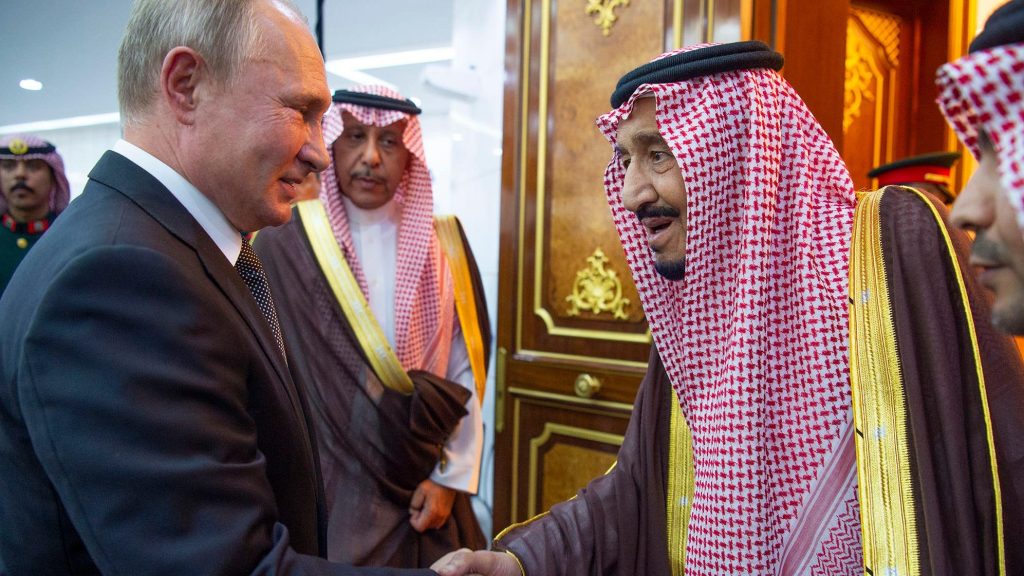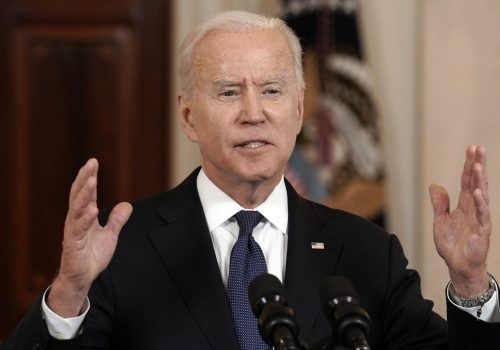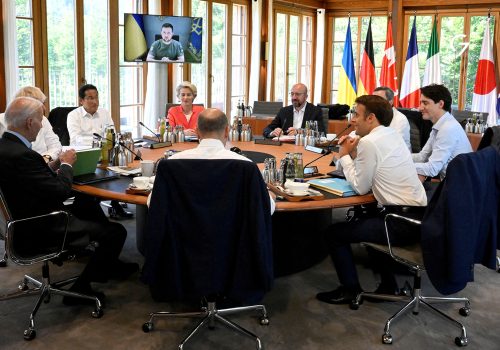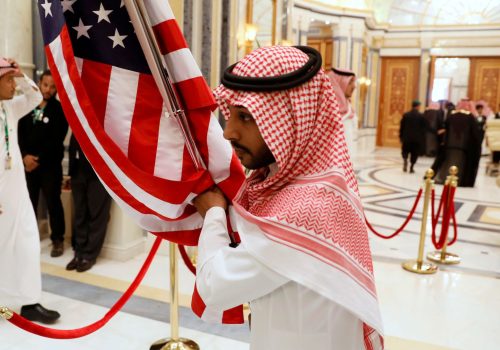Supporters of Ukraine are disappointed that governments across the Middle East have neither joined the West’s sanctions campaign against Russia nor taken any other meaningful action to help Kyiv fight Moscow’s aggression. Even traditional US allies in the region are unlikely to be persuaded by the Biden administration—much less the Ukrainian government—to chip in.
It comes as no surprise that Moscow’s closest partners in the Middle East, Syria and Iran, have expressed support for Russia’s invasion of Ukraine (with the latter even selling drones to assist the Russian campaign). If President Vladimir Putin fails there, those regimes are looking at a return to decades past, when Russia was less active in the region and therefore unable to support them against either the United States or its regional allies.
It might seem like Washington’s traditional Mideast allies, such as Saudi Arabia, the United Arab Emirates, and Israel, would have the opposite incentive—perceiving active support for Ukraine as an opportunity to gain favor with the Biden administration and strengthen them against Iran and Syria. But the reality is that governments in the region are simply not interested in becoming involved in Ukraine for fear of upsetting a diplomatic, economic, and political balance that they have long worked carefully to achieve.
Wealthy Arab Gulf oil producers have been reluctant to heed a White House call to export more oil in a bid to tamp down rising energy prices (a result of sanctions on Russian oil) for several reasons: They fear the petroleum price collapse that could result if they do, and they are also afraid that if Moscow sees them as taking actions that hurt Russian interests, it can—and will—take actions that hurt theirs, such as boosting support for Iran. Saudi Arabia and the UAE may also be reluctant to help the United States in Ukraine since they feel Washington is not helping them enough to fight Iranian-backed Houthi rebels in Yemen.
In Israel, meanwhile, there is similarly great fear that the Jewish state’s active support for Ukraine would mean that Russia would no longer abide by the Russian-Israeli deconfliction agreement, whereby Russian forces have largely turned a blind eye to Israeli attacks on Iranian and Hezbollah forces in Syria. Indeed, if Russia were to embed its troops within those forces, that could seriously constrain Israeli military activity in Syria (which is currently key to preventing Iran and Hezbollah from being able to attack the Jewish state from Syria). Meanwhile, Benjamin Netanyahu’s potential return to power following elections in November could put Israel on a policy crash course with the United States, given the generally positive transactional relationship he and Putin established over a decade of working as peers.
Many Middle Eastern countries have also relied heavily on grain exports from both Ukraine and southern Russia, which until recently had been disrupted by the war. While a Turkish- and United Nations (UN)-mediated agreement has eased the Russian naval blockade, the size of the future Ukrainian harvest is sure to diminish so long as the war continues. For those countries that are dependent on Black Sea agricultural imports, the Ukraine war ending sooner—even with a Russian victory that would allow grain exports to resume—is better than the war dragging on and continuing to negatively affect both supply and prices.
Ultimately, even if the United States were to walk away from the Iran nuclear deal negotiations or increase its support for Saudi and Emirati policies regarding Yemen, it is still unlikely that these countries would suddenly become more supportive of Ukraine. The risk of antagonizing Russia is just too great—especially when these countries fear (whether realistically or not) a declining American commitment to them.
Turkey is the one traditional American ally in the region that has helped Ukraine, both through selling highly effective drones and by working with the UN to mediate an agreement allowing Ukrainian grain to reach Middle Eastern and African customers. But Ankara is also not abiding by Western economic sanctions against Ukraine, providing a haven to wealthy Russians seeking to protect their assets (as has the UAE). Turkey, in short, has been able to take advantage of each side in the war.
Could Washington’s other Middle Eastern allies follow Ankara’s example by being less wary and more opportunistic? Some of them may want to—but the opportunities are limited. Despite the reported windfall Russia has received from its petroleum exports even amid Western sanctions, Moscow seems more inclined to spend on its war effort than on trade with or investment in the Middle East. Further, Middle Eastern governments that value Russia as an arms supplier—one that asks no questions about their human rights records—may find that Moscow is neither willing to sell (due to its own demand for arms) nor able to, since it can no longer produce weapons as readily due to the lack of imported semiconductors or other high-tech items.
Finally, Russia’s poor performance in the war has punctured the image of Putin as someone who is more successful than the United States or other Western governments at military intervention—as his 2008 invasion of Georgia, 2014 annexation of Crimea and intervention in eastern Ukraine, and 2015 campaign in Syria all seemed to suggest. Whatever doubts Middle Eastern governments may have about American commitment to their defense, Russia’s inability to defeat a country right on its border has not bred confidence about Moscow’s ability to successfully intervene farther afield.
The Biden administration would much prefer that its traditional allies in the Middle East were more supportive of Ukraine and critical toward Russia rather than stay neutral or balance between the two sides. But this is better than those allies coming out in support of Russia the way that Iran has—and this may be the best that Washington can expect.
Mark N. Katz is a nonresident senior fellow at the Atlantic Council and professor of government and politics at the George Mason University Schar School of Policy and Government.
Further reading
Tue, Jul 12, 2022
Biden’s big chance to build a new coalition in the Middle East
New Atlanticist By Daniel B. Shapiro
A regional coalition is emerging of US partners who face common security threats and share similar social, economic, energy, and climate-related challenges.
Mon, Jun 27, 2022
Can price caps on Russian oil tame the Kremlin? Our experts debate.
New Atlanticist By
Atlantic Council experts weigh in on whether a G7-driven price cap on Russian oil will have the intended effect.
Tue, Jul 12, 2022
How to rescue and rebuild the US-Saudi relationship
New Atlanticist By Jonathan Panikoff
The United States cannot ensure its economic and national security as successfully without Saudi Arabia as a key ally.
Image: Russian President Vladimir Putin meets Saudi Prince Salman bin Abdelaziz in Riyadh on October 14, 2019. Photo by SPA via / Latin America News Agency/REUTERS



